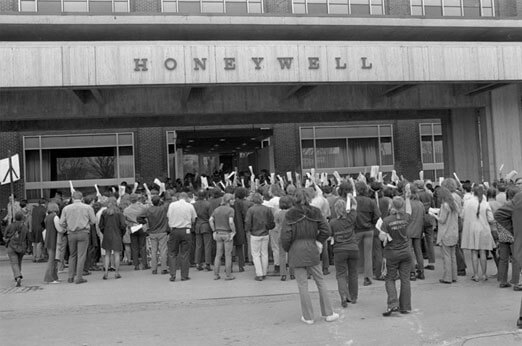By Willard Shapira | Roseville, MN
I joined Honeywell in 1965. At that time the company was best known for making thermostats that provided temperature controls. They were considered the leader in the field.
But when it became apparent there was big money to be made from the Vietnam war, Honeywell became involved in the arms business and specialized in making fragmentation bombs.
Many of the employees including me were none too happy about this development but we all needed our jobs. However, one courageous soul at the Hopkins plant was bold enough to post a sign reading: “The fragmentation bombs that shred Asian bodies are made in equal opportunity factories.”
My job consisted of writing flattering stories about a range of Honeywell employees including the ones at the Hopkins plant. They hated this and so did I but it had to be done to show the government Honeywell was “with the program.”
One experience still haunts me.
Before the bombs could be shipped for use in Vietnam, they had to be tested for reliability. This was done at a test range near Anoka. I was sent there to witness a test.
The workers at this site were different from their colleagues. They raved it up about how these bombs were going to “kill those damn gooks” etc etc etc.
Everyone knew what came next. He put on his flak suit and climbed down a ladder into the pit, knowing full-well the bomb could explode while he was tinkering with it.
A bomb was placed in a deep pit and wired to a control building a few yards away where we were to observe the test. Next to the bomb was a kind of old-fashioned football tackling dummy, representing “the enemy.” Included was a safety officer. It was his job to correct any malfunctions. If the bomb failed to detonate, he had to put on a kind of flak suit, descend into the pit and fix the problem. I asked him if this had ever happened. “Thank God, no.”
Of course, it happened this day. He pressed the firing button. Nothing. Again, nothing.
Everyone knew what came next. He put on his flak suit and climbed down a ladder into the pit, knowing full-well the bomb could explode while he was tinkering with it.
I urged him not to do it, quit the job on the spot and don’t risk his life for this.
Still, he went, fixed the problem and the bomb finally went off.

I was so sad and depressed, sweating, shaking, sick to my stomach, then drove home, remembering it was my birthday and that my then-wife was preparing my favorite meal for the family.
When I walked in, she took one look at me and gasped, “Oh, my God, what happened?”
Before I could tell her, I went into the bathroom, threw up, took a shower, told her to postpone the dinner and went to bed.
When I told my colleagues about this experience, they could hardly believe it. There was no possible way to write a story about this.
Honeywell garnered other Vietnam contracts dealing with avionics and torpedo guidance systems but nothing like fragmentation bombs.
Meantime, when the public learned Honeywell was making bombs as well as thermostats, our leading peacenik of that era, my former U of M classmate Marv Davidov, founded “The Honeywell Project” and led many marches to the front door of Honeywell headquarters just South of Minneapolis’ downtown district, demanding Honeywell stop making the bombs.
You can read about Davidov in a book entitled You Can’t Do that! Marv Davidov, Non-Violent Revolutionary.
I had other assignments not nearly as stressful as covering the Honeywell Vietnam War effort (the company has since largely relocated to New Jersey) and after nine years, I left Honeywell for a more peaceful job.
But I have occasional nightmares about that day at the Anoka test range and as I watch the Burns-Novick documentary “The Vietnam War” I wonder how many of the Asians we see dead or dying were victims of Honeywell fragmentation bombs. Then, too, there are the bombs that failed to explode during the war which maimed or killed people long after the war had ended. This is still happening!
A final thought: I was just as complicit in a crime against humanity as anyone else involved in the Vietnam war and there is no forgiveness for that.
Add your voice to the story at MNVietnam.org
© Twin Cities Public Television - 2018. All rights reserved.
Read Next



